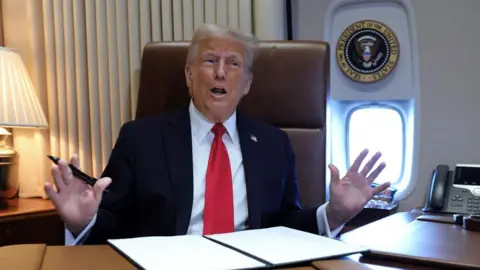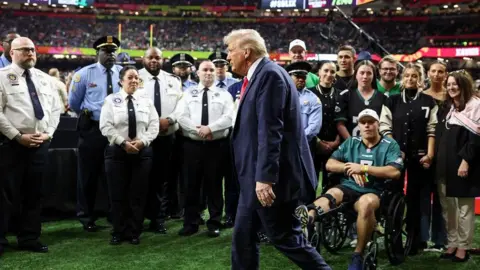Business reporter
 Reuters
ReutersPresident Donald Trump has said he will announce a 25% import tax on all steel and aluminium entering the US, a move that will have the biggest impact in Canada.
Trump also said that there would be an announcement later in the week about reciprocal tariffs on all countries that tax imports from the US, but he did not specify which nations would be targeted, or if there would be any exemptions.
“If they charge us, we charge them,” Trump said.
The move marks another escalation in Trump’s trade policy, which has already sparked retaliation from China.
Canada and Mexico are two of the US’s biggest steel trading partners, and Canada is the biggest supplier of aluminium metal into the US.
During his first term, Trump put tariffs of 25% on steel imports and 10% on aluminium imports from Canada, Mexico and the European Union.
But the US reached a deal a year later with Canada and Mexico to end those tariffs, although the EU import taxes remained in place until 2021.
Speaking aboard Air Force One, Trump said on Monday he would announce tariffs on “everybody” for steel and aluminium.
“Any steel coming into the United States is going to have a 25% tariff,” he said.
In response, Doug Ford, the premier of the province of Ontario, accused Trump of “shifting goalposts and constant chaos, putting our economy at risk” in an online post. Canada’s steel production is concentrated in Ontario.
Canadian political adviser Catherine Loubier said she believed Trump’s threats were real but believed there could be a solution because of how connected the two economies are.
“Hundreds of thousands of jobs in the US are linked to the steel and aluminium input from Canada into the US economy,” she told the BBC’s Today programme.
“I think there’s a lot at stake and nobody’s winning with these tariffs, that’s for sure.”
Trump’s comments caused the shares in major South Korean steel and car makers to fall. South Korea is a major exporter of steel to the US.
Meanwhile, Australian Prime Minister Anthony Albanese told parliament his government would “make the case” to the US for Australia to be given an exemption to any steel and aluminium tariffs – something they got during Trump’s first term.
Albanese also said he had a meeting scheduled with the US president.
 Reuters
ReutersTrump’s announcement on metal tariffs came as China’s introduced tit-for-tat import taxes on some American goods.
The measures have been introduced after the US imposed levies of 10% on imports of all Chinese products last week.
China has imposed a 15% border tax on imports of US coal and liquefied natural gas products and a 10% tariff on American crude oil, agricultural machinery and large-engine cars.
It has also imposed export controls on 25 rare metals, some of which are key components for many electrical products and military equipment.
Chinese government spokesperson Guo Jiakun said: “There are no winners in a trade war or tariff battle. What is harmed are the interests of the people of both countries.”
He urged the US to “correct its erroneous approach and stop politicising and weaponising economic and trade issues”.
Victor Gao, a Chinese diplomat and economist, said the rare metal export controls in particular were “in direct retaliation against the US imposition of policies denying Chinese access to semiconductor chips and many other AI developments”.
“And this is truly tit-for-tat because China wants to have free trade for all of these things.”
He blamed the US for the back and forth, but said China would not be too negatively affected because of US shoppers’ demand for cheap Chinese goods.
“[Chinese goods] are very much affordable and competitive even with a 10% tariff,” he told the BBC.
Tariffs are a central part of Trump’s economic vision – he sees them as a way of growing the US economy, protecting jobs and raising tax revenue.
Earlier this month, Trump threatened to impose import duties of 25% on Canadian and Mexican products but later delayed that plan for 30 days – until early March – after speaking to the leaders of both countries.
He also brought in new US levies of 10% on all Chinese goods coming into the US. Beijing has retaliated with its own set of tariffs which took effect on Monday.
Trump also said he would announce more tit-for-tat tariffs on “Tuesday or Wednesday” and that they would take effect “almost immediately” after the announcement.
“The ones that are taking advantage of the United States, we’re going to have reciprocal [tariffs],” he said. “It’ll be great for everybody, including other countries”.
On the trip to New Orleans, Trump also signed an proclamation designating 9 February “Gulf of America” day to celebrate his order renaming of the Gulf of Mexico, as his plane crossed the body of water.
Mexico argues the US cannot legally change the Gulf’s name because UN rules dictate that an individual country’s sovereign territory only extends up to 12 nautical miles out from the coastline.
Trump was also asked whether he had spoken to Russian President Vladimir Putin and replied: “I don’t want to talk about it, and if we are talking, I don’t want to tell you about the conversations too early, but I do believe we’re making progress.”
“I would imagine I would be meeting with Putin at the right time… at the appropriate time,” he said.
Trump also repeated his unlikely suggestions that the US could take over Canada and the Gaza Strip, saying Canada would fare better as the “51st state” and that he was “committed to buying and owning Gaza”.


